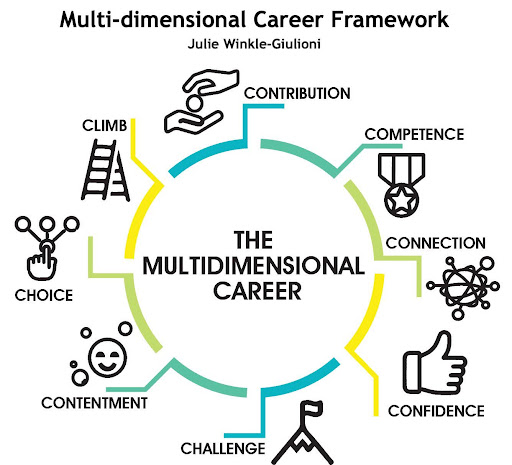A common theme among the women I coach–at all levels–is a clear awareness of the gender gap in workplace ambition and confusion about how to navigate it.
Key Takeaways
- Understanding Gendered Ambition Norms: Many women feel pressured to choose between achievement and agreeableness due to societal expectations. Men often lean towards assertiveness, while women may prioritize niceness, reacting to and perpetuating gendered stereotypes.
- Reframing Ambition: Ambition encompasses various motivations beyond vertical advancement, including personal growth, social connections, and making a difference. Recognizing these diverse motivations can help redefine success beyond traditional measures of authority and status.
- Evolving Gender Dynamics: Women are increasingly ambitious, challenging the notion of a gender gap in workplace ambition. However, corporate cultures often prioritize competitive and vertical ambitions, hindering the recognition of alternative career aspirations.
- Authenticity and Self-Knowledge: Navigating the gender gap in workplace ambition requires authenticity and self-awareness. By clarifying personal goals, remaining flexible in approach, and aligning actions with values, individuals can navigate stereotypes and biases to pursue their ambitions effectively.
- Managerial & Employee Challenge: Managers and employees need to recognize and manage diverse employee motivations, moving beyond traditional concepts of incentive structures that favor vertical ambition.
Photo by Wildan Zainul Faki
We all “know” that men are expected to be ambitious but that women are expected to be nice. And since ambition and agreeableness are assumed to be polar opposites, too many people choose one over the other. Men more often lean into the “a$$hole” extreme of the spectrum, and women often lean toward the “doormat” extreme. Beyond the urge to conform to social norms, there is pragmatic reasoning behind these leanings because both genders can be harshly penalized for non-conformance.
Women are routinely chastised–by well-meaning colleagues and biased bosses–for expressing too much interest in achievement (especially at the expense of ‘niceness’), whereas men are more often sidelined in their careers when they do not demonstrate that achievement motivates them. The reasons for this difference are probably myriad, but the bottom line is that everyone, including men, is penalized for stepping outside of gendered norms in obvious ways. This fundamental urge to conformity is probably at the root of the gender gap in workplace ambition, but when we look for solutions–how women can achieve and men can be more agreeable without penalty–we see that “ambition” is an unhelpfully broad term.
Is Ambition Important to Career Success? Yes.
We don’t really deserve promotions if we don’t accomplish things. Accomplishments make our effort and paycheck worthwhile. To accomplish and achieve things, we have to work hard, and to work hard, we have to want “it.” That drive no matter how big or small, towards whatever goal motivates us is at the core of ambition.
But why do we tend to look at ambition as narrowly as we do? To assume it means we want more authority, more money, more status? Just as often, people are motivated by making a difference, overcoming challenges, finding contentment, learning new things, social connections, and many other things. Julie Winkle Giulioni’s research for her book, Promotions are SO Yesterday found nine career motivations, most of which had little to do with what we think of as “ambitious.”

The gender gap in workplace ambition
You’d think there would be easy data out there on gender and ambition, but as usual, the true answer is that “it’s complicated.” There is apparently contradictory data to show both that women have less ambition than men and that women and men have equal amounts of ambition. It turns out that the key distinction many studies evaluated differed in the definition of ambition. In some studies ambition was interpreted primarily as vertical advancement (promotions to greater authority and compensation), while others included a wider variety of achievement types, more in line with Julie’s findings above. Researchers discovered this distinction by classifying two different ambition categories to explain the confusing findings on the gender gap in workplace ambition:
- Vertical ambition (e.g. focused on power, promotion, and money)
- Horizontal ambition (e.g., striving for self-development, mastery of the task in order to benefit communal goals)
As you might predict, men tended to score higher on vertical ambition and there was no gender gap on the horizontal dimension. This is consistent with other research on competitiveness, which has found that while men showed greater willingness to apply for projects described as “competitive,” both genders were equally interested in projects described as “competitive and collaborative.”
Women are becoming more ambitious over time. Especially since the pandemic changed many people’s assumptions about how work and life can be juggled, women are more ambitious than ever (as are men).
Roughly 80 percent of women want to be promoted to the next level, compared with 70 percent in 2019. And the same holds true for men. Women of color are even more ambitious than White women: 88 percent want to be promoted to the next level. – McKinsey Women in the Workplace 2023
So, is there a gender gap in workplace ambition? I’d say no. Women and men are both ambitious, but–for many reasons–what they hope to achieve and how they hope to achieve it varies. The problem is that most of our corporate cultures are quicker to reward the “vertical” and “competitive” ambitions more than the other types. This is mostly likely a product of the competitive environment firms must win in to stay afloat, and it fuels the male standard of competitiveness, which is no doubt self-reinforcing.
Can I be both ambitious and feminine?
This is the question I get asked most often by my female clients–especially the ones who come to me interested in vertical ambition. These ambitious women tend to run straight into that double standard in their own mind, where they assume they can be either achievement-oriented or feminine (i.e. nice, agreeable, pleasant, etc.) but not both.
It turns out these go-getter women are not the only ones. Most other women who seek out coaching to better themselves and their careers, even those who profess not to care much about vertical success, will cautiously admit that they really would like vertical promotions and recognition, they’re just afraid to say that out loud. Of course, they are succumbing to the same stereotypical double-bind assumptions as those who will admit their ambitious goals more readily, they’ve just leaned further into the “nice” end of the spectrum with their personal brand.
To their credit, all of these women are in touch with their authentic feminine selves enough to want to succeed and live in their skin as feminine creatures while learning, growing, advancing, and gaining power.
So, as with navigating all double standards, the solution lies in authenticity. The trick is to know your ‘why’ and what you want to spend your ‘drive’ energy on accomplishing. The clearer you are on your accomplishments, the more flexibility you give yourself in how you achieve them. And once you are clear on the goal, you can challenge yourself to solve this puzzle:
- Know your goal and why it’s important to you and others
- Remain flexible in how you achieve it
- Act in ways aligned with your personal values and personal brand while balancing both agentic and communal leadership styles
- Figure it out: don’t give up on your goal
How can I manage employees who do and don’t display ambition?
Managers face an ongoing challenge in motivating their workforce, mostly because people are different. Everyone isn’t motivated by the same things. Most traditional business incentive structures favor those with vertical ambition more than those with horizontal ambition. This is a huge missed opportunity, and as the cost of employee turnover becomes clearer to companies, there is a more serious trend towards finding ways to motivate people who could care less about ‘achieving’ the corner office.
As a manager, start by reading Julie Winkle Giulioni’s book Promotions are SO Yesterday. It is chock full of great ideas on how to find out what motivates your employees, things you can often give them when you don’t have a promotion to hand out to everyone.
Also, be aware of your own biases. It’s natural for people to default to thinking everyone is motivated by the same things they are. If you’re a manager, you probably have some vertical ambition. That’s great! But you can’t assume that all your people do, or that even if they do, their ambition will look like yours.
For example, too many managers assume that when a woman takes time off to have a baby, she’s stopped being professionally ambitious. This is quite often not the case, she just can’t be in two places at once. Especially if her leadership is flexible with her–both on her time and her professional growth opportunities, she can come back “on line” for promotions in the future. Get to know your valuable employees, know what motivates them and feed that motivation as much as you can.
How can I be ambitious even if I don’t care about becoming CEO?
If you want to be the boss, you probably have an ambition profile that will be recognized and–if you’re good at your job and leadership–will probably be rewarded. Even so, you’ll need to navigate the gender gap in workplace ambition. See above for the four steps to authenticity, which will help you navigate these challenges, including some that are not gendered.
But if you’re not a vertically motivated person, get to know yourself as well as you can. What will motivate you to keep going? What drives you to succeed? Be sure you’re clear on this and communicate it to your bosses. This makes you less vulnerable to their stereotypes about you. If you’re that mom who wants to come back “on line” after kids, ask for assignments that can continue to help you grow even when you need more flexible time schedules. Do some career planning yourself and identify the gaps in experience you need to fill to be ready for the vertical opportunities you will seek in the future. Work with your company to help you fill the gaps in a way that also fits your life.
Curate your personal brand. Be aware that “doing good work” won’t get you what you want if nobody notices. Ambition means bettering yourself, but it also implies being seen as bettering yourself, accomplishing things that matter along the way, by people who can influence your career.
As you manage your personal brand, working around the gender gap in workplace ambition and other stereotypes and biases, remember that authenticity is your friend. Authenticity requires clear self-knowledge, drive, and hard work, everything an ambitious person has in quantity. Go for what you want, and don’t give up.
How to Write Your Resume Accomplishments
Examples Included!
A step-by-step worksheet on how to draft accomplishments for your
resume, LinkedIn profile, cover letter, interviews, networking and performance reviews.







